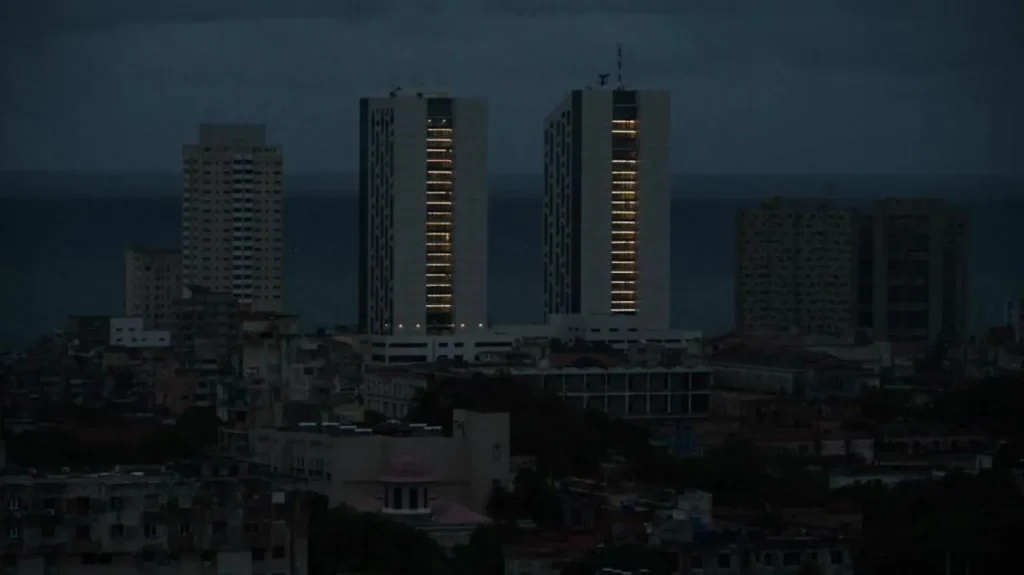
Cuba Faces Nationwide Blackout After Power Plant Failure
Cuba is currently dealing with a nationwide blackout after the failure of its largest power plant, affecting 10 million people. The power grid collapsed at around 11:00 local time (15:00 GMT) on Friday, disrupting the island’s electricity supply.
The energy ministry announced the failure on social media but did not provide an exact timeline for when power would be restored. The blackout has worsened Cuba’s existing energy crisis, which had already caused months of rolling blackouts. Just the day before, Prime Minister Manuel Marrero declared an “energy emergency.”
Major Power Plant Shutdown Causes Collapse
The blackout began after the Antonio Guiteras power plant in Matanzas—Cuba’s largest energy facility—went offline. President Miguel Díaz-Canel Bermúdez emphasized that restoring electricity is the government’s top priority. He reassured citizens, writing on X, “There will be no rest until power is restored.”
Lazara Guerra, head of electricity supply at the energy ministry, confirmed that power restoration had started, though the process was in its early stages. Some electricity was already being generated and used to restart power plants in different regions.
Government’s Response and Public Frustration
In response to the blackout, the Cuban government ordered the closure of all schools and non-essential activities, including nightclubs, until Monday. Officials urged non-essential workers to stay home to conserve electricity. Additionally, the government suspended non-vital services and encouraged citizens to reduce the use of high-consumption appliances like refrigerators and ovens during peak hours.
The blackout has left many residents frustrated and worried. Eloy Fon, an 80-year-old living in Havana, expressed his concerns: “This is crazy. It shows how fragile our electricity system is… We live day to day.”
Bárbara López, a 47-year-old digital content creator, has faced her own struggles, saying she had barely been able to work for two days. “It’s the worst I’ve seen in 47 years,” she added. “No power, no mobile data—it’s a mess.”
A Longstanding Energy Crisis
Cuba’s energy system has been under strain for months due to a combination of fuel shortages, aging infrastructure, and rising demand. On Thursday, Prime Minister Marrero addressed the nation in a televised speech, attributing the frequent outages mainly to the fuel shortage. He said, “The fuel shortage is the biggest factor contributing to this crisis.”
Alfredo López Valdés, head of the National Electric Union (UNE), acknowledged that the island has faced severe energy challenges, with the lack of fuel making it difficult to keep the power grid stable.
Tensions Rise During Extended Blackouts
Long blackouts like the current one often lead to heightened tensions in Cuba. In July 2021, protests erupted after days-long power outages left citizens struggling without basic resources. Food spoiled in warm refrigerators, air conditioning stopped working in the sweltering heat, and electric water pumps stopped bringing water to homes.
Many Cubans also couldn’t drive or work due to fuel shortages, further deepening the crisis. As power outages persist, there is growing concern about how this will impact daily life across the island.
In March, residents in Santiago, Cuba’s second-largest city, staged a rare public protest, demanding an end to the blackouts and food shortages. The government is increasingly aware that public patience is wearing thin. Some citizens are now willing to voice their discontent and even take to the streets if conditions worsen.
As the Cuban government works to restore power, the country remains tense. Citizens hope that the situation will improve soon, but many are prepared for continued challenges.
For more updates on Cuba’s energy crisis, visit BBC News.
Explore more stories on energy and infrastructure at Kenkou Land.



